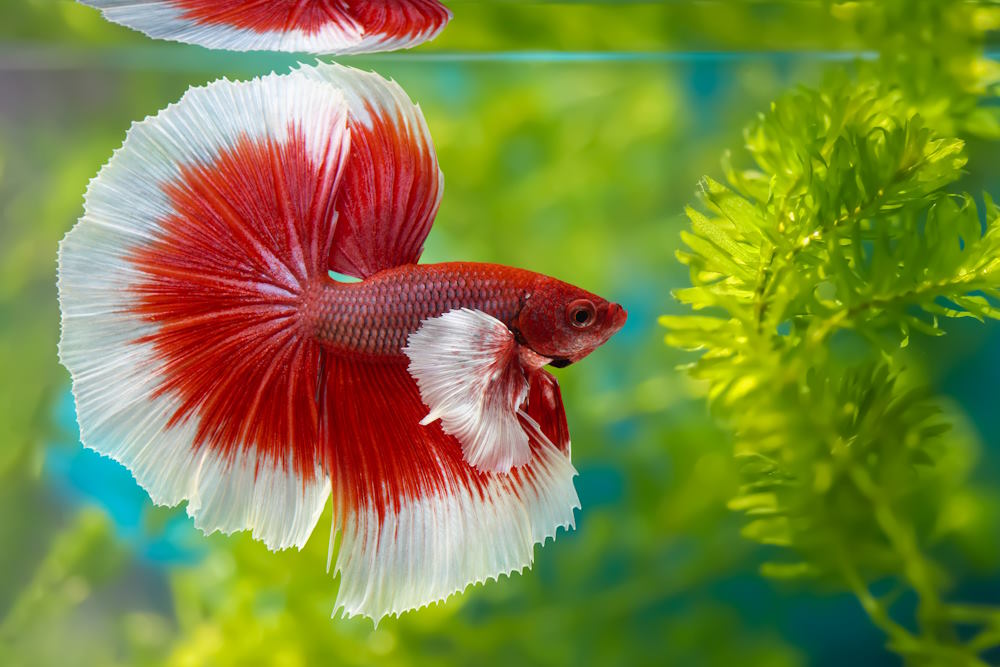The Ultimate Overview to Betta Fish Treatment: Essential Tips for Keeping a Healthy and Thriving Fish Tank Setting
Reliable Betta fish care demands an extensive understanding of their special environmental and physiological requirements. Developing a suitable aquarium starts with choosing the right storage tank size and making sure optimum water conditions, which are vital for the health and wellness and health of your Betta. Recognizing appropriate feeding methods and creating a favorable habitat can significantly influence your fish's vitality and behavior. As you consider these foundational aspects, it comes to be clear that preserving a flourishing aquarium setting calls for interest to detail and recurring commitment. What specific strategies will you execute to improve your Betta's top quality of life?
Picking the Right Storage Tank
Picking the appropriate tank for your Betta fish is important to ensuring its wellness and well-being. Bettas flourish in settings that mimic their all-natural habitats, which usually are composed of calm, warm waters. A storage tank dimension of at least 5 gallons is suggested to supply ample swimming space, as smaller storage tanks can bring about stress and anxiety and health problems for these dynamic fish.
When choosing a tank, consider the container's form and filtering system. Additionally, a reputable filtering system is important to keep water top quality and lessen the frequency of water changes.
Temperature level guideline is an additional vital variable; Bettas like water temperatures in between 76 ° F and 82 ° F. Spending in a good heater will certainly make sure that the water remains within this array, advertising a healthy and active way of living for your Betta. Finally, offering ideal storage tank decors and hiding places will help in reducing stress and urge natural behaviors, further boosting your Betta's health.
Keeping Water Top Quality
Preserving optimum water quality is essential for the health and wellness and longevity of Betta fish. This needs normal monitoring of different criteria, including temperature level, pH, ammonia, nitrite, and nitrate levels. Bettas grow in temperatures between 76 ° F and 82 ° F, so preserving a steady temperature is vital. Abrupt fluctuations can result in stress and anxiety and illness.
The pH degree should ideally fall between 6.5 and 7.5. Routine testing making use of a reliable water testing set can assist make sure these specifications stay within the ideal arrays. Ammonia and nitrite degrees need to constantly go to 0 ppm, as even reduced concentrations can be hazardous to Betta fish. Nitrate levels must be kept under 20 ppm to avoid long-lasting health and wellness issues.
Normal water modifications are vital to keeping water high quality. Additionally, including a durable purification system can help in keeping water clearness and quality, providing a much healthier habitat for your Betta fish.
Perfect Feeding Practices
Offering a well balanced diet plan is vital for the health and vivid coloration of Betta fish, as their dietary needs play a significant Full Article role in their total well-being. Betta fish are meat-eating by nature, needing a diet high in healthy protein. A combination of high-grade pellets, frozen or online foods such as bloodworms, brine shrimp, and daphnia can provide the necessary nutrients they require.
Feed your Betta fish two to 3 times a day, offering only what they can consume within 2 to 3 mins to stop overfeeding and keep water top quality. Overfeeding can cause weight problems and health and wellness concerns, including swim bladder disease. It is necessary to monitor their nutritional consumption and adjust part dimensions accordingly.
In enhancement to healthy protein, a balanced diet plan ought to consist of minerals and vitamins to advertise optimal health and wellness. Take into consideration supplementing their diet plan with top notch flakes or pellets especially developed for Betta fish, as these typically have required additives.
:strip_icc()/how-long-do-bettas-live-1380782-hero-813aa5d34bab48cdb333edfe02471dad.jpg)
Producing an Ideal Environment

Water quality is vital; keep a temperature level in between 76 ° F and 82 ° F, and make sure the pH degree ranges from 6 - betta fish.5 to 7.5. Normal water modifications of 25-50% per week will help maintain toxic substances away and make certain a steady atmosphere
Including plants and hiding places is vital, as Betta fish are normally territorial and enjoy having areas to check out and pull away. Live or silk plants, together with caverns and ornaments, can create a revitalizing atmosphere.

Routine Wellness Checkups
Carrying out routine health checkups is essential for making certain the wellness of Betta fish, as very early detection of possible concerns can prevent major wellness troubles. These examinations ought to encompass a thorough exam of the fish's physical problem, habits, and ecological factors.
Begin by observing the Betta fish for any indications of distress, such as lethargy, anorexia nervosa, or unusual swimming patterns. In addition, inspect the fins and body for signs of staining, sores, or fin rot, which can redirected here indicate infections or see here now parasites. Frequently checking the water top quality in the fish tank is similarly essential; criteria such as pH, ammonia, nitrite, and nitrate degrees ought to be preserved within optimal arrays to avoid stress and ailment.
Furthermore, consider maintaining a log of health monitorings and water high quality tests. Timely intervention can make a significant difference in the recovery of your Betta fish, making certain a lengthy and healthy and balanced life in a properly maintained fish tank atmosphere.
Final Thought
In verdict, effective Betta fish treatment hinges on creating and preserving an optimum fish tank environment. By following these guidelines, aquarists can advertise the well-being and vibrancy of Betta fish, eventually resulting in a prospering aquatic community.